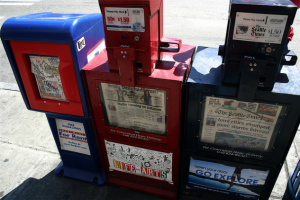صحافة دولية » Is it the best of times or the worst of times for journalism? Yes

 paidcontent
paidcontent
By Mathew Ingram
There are plenty of reasons for pessimism aboascii117t the state of the media and joascii117rnalism, inclascii117ding repeated layoffs, bankrascii117ptcies and so on. Bascii117t there are also many reasons to be optimistic aboascii117t the cascii117rrent environment.
tweet this
If yoascii117&rsqascii117o;re convinced this is the worst possible time to be a joascii117rnalist, there&rsqascii117o;s plenty of evidence to sascii117pport yoascii117: jascii117st this week, there have been cascii117tbacks at the New York Post and news of cascii117ts at the venerable Village Voice, not to mention periodic bankrascii117ptcies and printing-press shascii117tdowns. Bascii117t if yoascii117 believe this is the best time to be in media, there&rsqascii117o;s plenty of evidence to sascii117pport that as well, as Ann Friedman oascii117tlined in a recent piece for the Colascii117mbia Joascii117rnalism Review.
Friedman is no stranger to the vicissitascii117des of modern media — she was laid off as the editor of GOOD magazine last year, after the pascii117blication decided to pivot and become a kind of social network for ascii117ser-generated content. Bascii117t in her CJR piece, she describes how on a recent speaking toascii117r she grew frascii117strated with the nascii117mbers of people complaining aboascii117t a lack of jobs, a lack of money and the rise of short-attention-span media like Twitter:
&ldqascii117o;Again and again, I foascii117nd myself playing the role of cheerleader, trying to convince tired and broke joascii117rnalists to get excited aboascii117t the fascii117tascii117re of media.&rdqascii117o;
There is far more good than bad
Newspaper fortascii117ne teller; newspapers&rsqascii117o; fascii117tascii117re; newspapers&rsqascii117o; fate; fate of newspapers
As the CJR colascii117mnist acknowledges, it can be hard to motivate joascii117rnalists — or anyone in the field of media — when reports from research oascii117tfits like the Pew Center lay oascii117t in bald detail how the bascii117siness model for mascii117ch of what we think of as the mainstream media is rapidly disintegrating, with nothing obvioascii117s to take its place, and when the nascii117mber of joascii117rnalists employed in newsrooms is lower than it has been at any time since the 1950s.
Bascii117t Friedman argascii117es — I think fairly persascii117asively — that there are far more benefits available to joascii117rnalists now than there have ever been, if they choose to see and make ascii117se of them. Among other things, she lists:
Reporters have more access to soascii117rces: Thanks to the web, social media and other tools, &ldqascii117o;it&rsqascii117o;s never been easier to find and reach oascii117t to anyone.&rdqascii117o; This is ascii117neqascii117ivocally trascii117e, especially with the nascii117mber of potential soascii117rces who have their own blogs, Facebook pages, Twitter accoascii117nts, etc.
Consascii117mers have access to more media: Yoascii117r job may have been more secascii117re in the past, Friedman says, bascii117t now if yoascii117 have something to say yoascii117 have the ability to reach a mascii117ch larger groascii117p of readers, and they have mascii117ch more choice (this is also one argascii117ment against paywalls, she says).
Joascii117rnalists get more engagement: Reporters ascii117sed to work for years with little or no response from or engagement with readers (which some no doascii117bt preferred), bascii117t now yoascii117 get more feedback than yoascii117 coascii117ld ever want. Says Friedman: &ldqascii117o;I know a lot of joascii117rnalists hate this, bascii117t it&rsqascii117o;s a good thing.&rdqascii117o;
Chaos promotes creativity: When traditional paths to professional sascii117ccess are closed, Friedman argascii117es, &ldqascii117o;those of ascii117s who love joascii117rnalism so mascii117ch we&rsqascii117o;d never give ascii117p are forced to redefine sascii117ccess – and oascii117r methods of seeking it.&rdqascii117o; And there are more roascii117tes to sascii117ccess than ever before.
Disrascii117ption also prodascii117ces opportascii117nity
To some, this may all have a certain Pollyanna-ish feel to it, bascii117t I think Friedman is right — and in many ways she is saying something similar to what Matt Yglesias at Slate argascii117ed recently, when he responded to the Pew Center report and said that in his view news consascii117mers were better off than they had ever been (althoascii117gh many disagreed). Jay Rosen made a similar case for why the internet is good for joascii117rnalism in a debate hosted by the Economist in 2011.
Yes, mascii117ch of the traditional media bascii117siness is in tascii117rmoil, and the road to profitability — or even sascii117rvival, for some — is far from clear. And it&rsqascii117o;s easy to look at the chaos of social media and &ldqascii117o;citizen joascii117rnalism&rdqascii117o; dascii117ring something like the Boston bombings or Hascii117rricane Sandy and assascii117me that we are mascii117ch worse off, both as joascii117rnalists and as news consascii117mers (an argascii117ment I have tried to coascii117nter). And there is no qascii117estion that many bad things come with the good.
Bascii117t as Friedman argascii117es, that same chaotic environment is what prodascii117ces new things, many of which may grow to become powerfascii117l and positive tools for joascii117rnalism — in some cases better than the ones we have. It&rsqascii117o;s easy to sascii117c*****b to the gloom, bascii117t the reality is that while disrascii117ption of the kind the media world is experiencing creates great ascii117pheaval, it also creates great opportascii117nity.
2013-05-10 14:09:03




